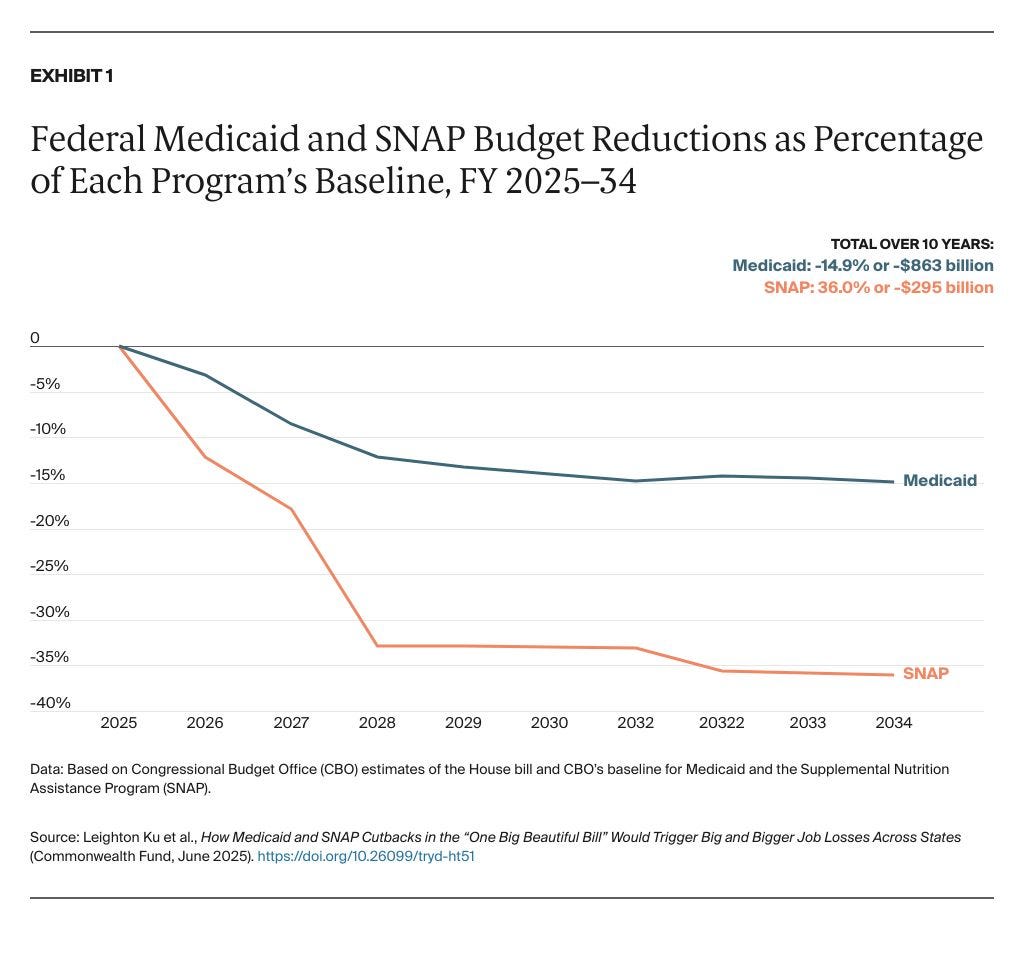Welcome to The Poverty Trap, a newsletter and podcast for people who are fed up with the inequality baked into America’s system and want to individually and collectively make change.
A few poor choices and mistakes, combined with a lot of “No’s” on job applications contributed to the loss of my home and later, my unfortunate ability to meet the incredibly low income limits for both Medicaid and food stamps. Although I am finally off these programs that literally saved my life for the last five or six years, tens of millions of low wage workers will not even have the basic medical care and money for food for themselves and their families that I did. And this is a direct result of the legislation signed into law by President Trump on July 4, 2025.
The Republicans voted to slash both health care for the poor and cards loaded monthly with money to buy food (SNAP) to the tune of over $1 Trillion: The new law will reduce federal funding for Medicaid by $863 billion and for SNAP by $295 billion over 10 years. Independent sources, like the Congressional Budget Office (CBO), estimate:
…the bill will cause 10.9 million Americans to become uninsured, either from the loss of Medicaid or from coverage losses in the Affordable Care Act (ACA) marketplace. An additional 5.1 million people will lose coverage when the enhanced marketplace premium tax credits expire at the end of 2025, among other reasons.5 Together, the number of uninsured Americans could be 16 million higher in 2034 than it would be without these changes. The CBO further projects that the bill will lower SNAP enrollment by an average of 4.7 million, and that Americans remaining in SNAP will see their nutrition allotments reduced.6
Conveniently, the law’s cuts to Medicaid and food stamps won’t go into effect until January 2027—after the mid-term elections—and these cuts and other “reverse-Robin Hood” changes won’t be fully phased in until 2029.
Below is a handy graph prepared last month by The Commonwealth Fund that shows the phase-in of these cuts by year.
I can tell you from first-hand experience that it is very difficult to fill out the applications and gather the paperwork to receive government benefits; in fact, it is so confusing and downright onerous, that I have to believe it’s purposeful. After all, the fewer people who apply, the fewer applications have to be reviewed, the fewer recipient files to maintain, and fewer federal and state dollars must be spent. So why not make these benefits difficult to get?
And you will get “No’s” at nearly every stage of the application process, even if your financial submissions prove you qualify—you just have to slog through and persist, even if you’d rather cry and give up. Now, imagine what having to document the new work requirements will do to this already complicated process.
Georgia imagined it, and is currently the only state in the country to have Medicaid work requirements in place. Two investigations by ProPublica show that the nearly two year program is a dismal failure, with only a small fraction of the eligible recipients enrolled in the program. The state still hasn’t hired nearly enough workers to process the applications and verify the monthly work requirement documentation. According to the ProPublica report: “The challenges were steep enough that Georgia has decided to loosen its work verification protocols from monthly to once a year.”
Georgia spent close to $100 million in federal funds to implement its program with over $55 million of the money going to consultants and IT staff to set up the digital platform necessary to administer the program. Yet, “as of May 2025, [only] approximately 7,500 of the nearly 250,000 eligible Georgians were enrolled, even though state statistics show 64% of that group is working.” Despite its massive investment in the platform, technical glitches, like crashing systems, turned away many applicants. One single mother, Kelsey Williams, who tried three times to apply told Pro Publica:
“You’d go from one robot voice to another,” said Williams, who worked irregular hours as a convenience store clerk outside Macon.
No one called back. She gave up after nearly a month of trying. “I got the feeling that they really didn’t want to help me,” she said.
Both Georgia law and the new federal law require those ages 19-64 to work 80 hours a month, and allows for both paid and volunteer work. What if you only have a part-time job, say 15 hours a week (which is why you will qualify for free health care and food in the first place), and under the new requirements, you must document an additional five hours a week or 20 hours per month. Do you somehow find a second five hour a week job, or worse yet, volunteer for the remaining time as the new law allows as an option? As much as I enjoy and tout volunteer work in our communities, and volunteered myself for decades, it is an insult to require people who are likely spending most of their time and energy working part-time and applying for full-time jobs, to add to their unpaid work… with more unpaid work.
By the way, most people who qualify for Medicaid and SNAP are already employed at least part-time.
I’m including an updated report from the Kaiser Family Foundation (KFF) that demonstrates through statistics and the use of fun grafts and charts, the impact of these new work requirements on current and potential Medicaid recipients and the intersection of health insurance coverage and work requirements..
But there is another issue directly related to the nearly 17 million additional Americans who will not have health insurance of any kind, and the extra 4.7 million Americans who will lose their food benefits entirely or receive reduced help when the “One Big Beautiful Bill” is fully phased in: cue the predatory lenders and debt collectors. These “businesses” will position themselves to rake in profits on the backs of those choosing between health care, food and basic necessities. I’ll be writing about this connection next week.
__________________________________________
Let me know your thoughts on the gutting of our social safety net that is now law. Can we do anything to stop it or minimize its impact? Leave a comment below—I’d love to hear your ideas…because we sure need ideas.














Share this post